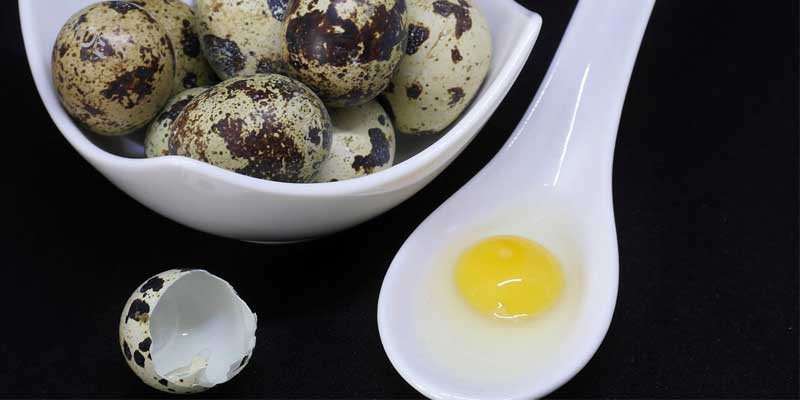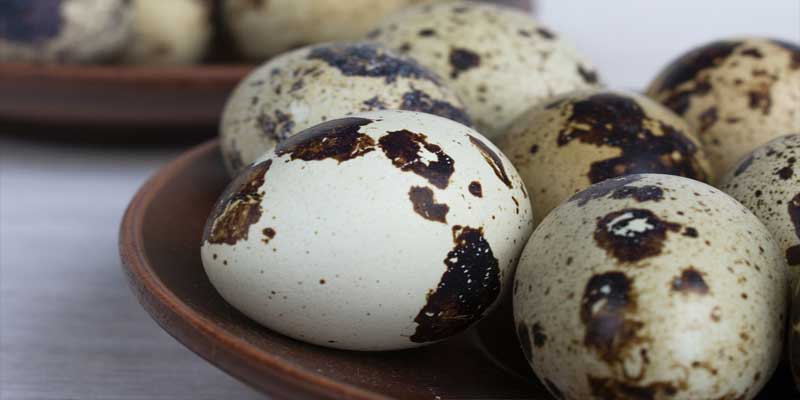Recent years have seen a surge in attention towards quail eggs, primarily for their nutritional value and culinary versatility. Brimming with essential nutrients, these small wonders are thought to confer diverse health benefits. Though typically consumed cooked, an escalating curiosity surrounds the possibility of raw consumption for quail eggs.
This article delves into the safety considerations of consuming raw quail eggs, while also exploring their potential benefits.
Can You Eat Raw Quail Eggs?
Yes, raw quail eggs are consumable in the same manner as raw chicken eggs; freshness and appropriate handling primarily determine their safety. Nonetheless, akin to all uncooked egg varieties, a minimal risk of bacterial contamination persists, particularly from pathogens like Salmonella.
Ensuring the freshness, cleanliness, and proper storage of eggs is essential before one consumes them raw. Some individuals relish raw quail eggs either as a delicacy or an ingredient in select dishes.
However, concerns over consuming raw eggs exist; therefore, pasteurization might be worth considering to mitigate potential risks associated with foodborne illness.
Nutritional Composition of Quail Eggs
Despite their small size, quail eggs pack a nutritional punch: high levels of protein, vitamins, and minerals. This makes them an invaluable addition to any balanced diet; typically providing about 14 calories – one gram of protein alone!
Moreover, the rich array doesn’t stop there–it includes micronutrients such as Vitamin A, Vitamin B12 riboflavin — even selenium. Various bodily functions depend on these crucial nutrients: they maintain healthy vision; support nerve function and boost immunity.
Safety Concerns Associated with Raw Consumption
Eating any type of raw egg, even quail eggs, presents specific risks. We primarily worry about the possible existence of detrimental bacteria – notably Salmonella. Contamination by Salmonella is possible on either the outer shell or within it; this pertains specifically to yolk and egg white. Consuming raw eggs poses a risk of contracting foodborne illnesses, which can cause symptoms like nausea, vomiting, diarrhea, and fever.
Compared to chicken eggs, quail eggs pose a relatively low likelihood of Salmonella contamination. Quails boast cleaner living conditions, minimizing their exposure to pathogens and reducing their susceptibility to Salmonella contamination.
Furthermore, the thicker shells of quail eggs in comparison with those from chickens offer an additional layer of protection against potential contaminations. These factors, however, do not eliminate the risk when consuming raw quail eggs as one should exercise caution.
Benefits of Consuming Raw Quail Eggs
Quail egg enthusiasts, valuing potential health benefits over safety concerns linked to raw consumption, present a compelling argument: the nutritional integrity of an egg remains intact when uncooked, which is a quality often compromised by certain cooking methods.
Indeed; proponents assert that consuming raw quail eggs could confer several advantages – they may bolster immune function, enhance skin health, and provide a dense source of essential nutrients.
1. Enhanced Nutrient Absorption: Consuming raw quail eggs, some argue, permits superior absorption of nutrients due to the preservation of heat-sensitive vitamins and enzymes; yet–limited is the scientific evidence that substantiates this claim.
2. Improved Digestive Health: Lysozyme, an enzyme found in raw quail eggs, potentially enhances digestive health through the breakdown of food particles and facilitation of nutrient absorption; nevertheless – further investigation remains imperative to substantiate these assertions.
3. Potential Immune Support: Quail eggs harbor potential immune support: compounds such as ovomucoid may wield properties that boost the immune system. Believers in raw quail egg consumption argue for its capacity to fortify our body’s defense mechanisms; however, we must note concrete evidence remains elusive.
4. Rich Source of B Vitamins: Quail eggs teem with an abundance of B vitamins, notably encompassing B12, riboflavin, and folate; advocates posit that ingesting these raw may yield superior advantages over their cooked counterparts.
Safety Measures When Consuming Raw Quail Eggs
Deciding to consume raw quail eggs despite the associated risks necessitates taking certain precautions; these measures are crucial in minimizing the likelihood of foodborne illness.
1. Source Quality Eggs: Purchase quail eggs from suppliers renowned for their stringent hygiene practices and exceptional egg-handling standards: prioritize sourcing quality eggs.
2. Inspect Eggs: Before you consume raw quail eggs, make sure to inspect them for any cracks or abnormalities; if there are damages – discard these particular eggs. They might be more susceptible to contamination.
3. Wash Hands and Surfaces: Ensure a thorough washing of your hands, utensils, and all surfaces that directly touch raw eggs; this preventative measure halts cross-contamination.
4. Proper Storage: Refrigerate quail eggs at temperatures below 40°F (4°C) to impede bacterial growth and preserve their freshness.
5. Consume Fresh Eggs: To minimize the risk of bacterial contamination, consume raw quail eggs as soon as you purchase them.
Conclusion
Raw quail eggs, despite their potential health benefits, present inherent risks: the possible bacterial contamination. Those contemplating consuming them raw must rigorously consider these factors; they should also implement suitable precautions, notably to decrease the chances of foodborne illness.
Cooked quail eggs offer a safe and nutritious option; they provide many of the same health benefits without accompanying risks: therefore presenting an attractive alternative for consideration. Prioritizing safety and moderation for overall well-being is essential in any dietary choice.

Kate has been in the food business for over 20 years. Worked as a cook at several buffets which include Old Country Buffet, Five Star Buffet, and Ichiban Buffet. Now, I’m mostly at home cooking for my family, caring for chickens and ducks, and tending the garden.


